Dealing with Afghan refugees
Issuance of PoR cards is a welcome move, as it removes uncertainty from the lives of almost two million people.

Ideally, the government would like to see all Afghans return home, as the best solution for all of them lies within their own country. PHOTO: AFP/ FILE

Although this further extends the stay of Afghan refugees in Pakistan and does nothing to reduce the very considerable burden and strain their presence has placed on scant resources, this is a welcome move. It removes uncertainty from the lives of almost two million people and enables medium-term planning to meet their needs by a range of agencies and entities other than the Government of Pakistan, which will remain heavily reliant on the support of external donors to share the cost of providing a modicum of security for Afghans in Pakistan. Ideally, the government would like to see all Afghans return home, as the best solution for all of them lies within their own country. Since 2002, around 3.8 million have returned home, with returnees forming a quarter of the current population of Afghanistan. Further instability is on the Afghan horizon and it is possible that Pakistan will again have to shoulder a huge human burden. This is a burden that international donors must share.
Published in The Express Tribune, February 28th, 2014.
Like Opinion & Editorial on Facebook, follow @ETOpEd on Twitter to receive all updates on all our daily pieces.















COMMENTS
Comments are moderated and generally will be posted if they are on-topic and not abusive.
For more information, please see our Comments FAQ